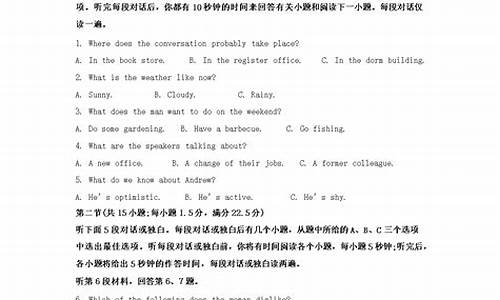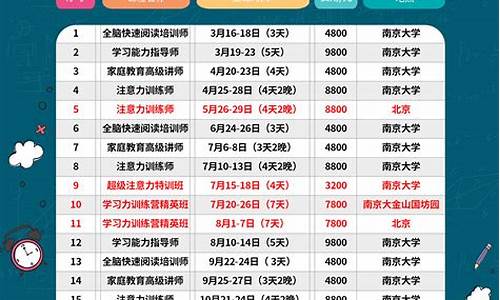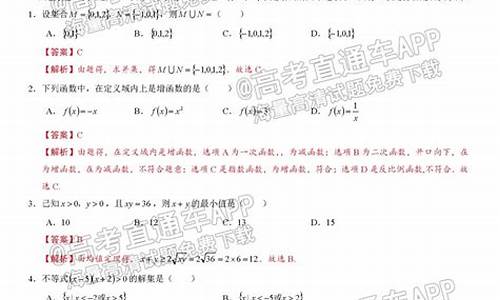您现在的位置是: 首页 > 招生信息 招生信息
高考英语2023全国二卷_高考英语2007
tamoadmin 2024-06-02 人已围观
简介1.2007年全国高考1卷英语单选2.2007宁夏高考英语答案2007上海高考听力原文\答案与分析(6月中旬完成的,忘了放到网上和新高三同学共享)听力试题:I. Listening Comprehension Part A Short Conversations Directions: In Part A, you will hear ten short conversations
1.2007年全国高考1卷英语单选
2.2007宁夏高考英语答案

2007上海高考听力原文\答案与分析
(6月中旬完成的,忘了放到网上和新高三同学共享)
听力试题:
I. Listening Comprehension
Part A Short Conversations
Directions: In Part A, you will hear ten short conversations between two speakers. At the end of each conversation, a question will be asked about what was said. The conversations and the questions will be spoken only once. After you hear a conversation and the question about it, read the four possible answers in your paper, and decide which one is the best answer to the question you’ve heard.
1. A. Coke. B. Coffee. C. Tea. D. Water.
2. A. At a restaurant. B. At a studio. C. At a concert. D. At a theatre.
3. A. Relieved. B. Worried. C. Confused. D. Depressed.
4. A. The Browns. B. The Browns’ son. C. The postman. D. The neighbour.
5. A. At 7:00. B. 7:10. C. 9:00. D. 9:10.
6. A. The ring is not hers. B. She doesn’t have gold rings.
C. She prefers gold to silver. D. She lost her silver ring.
7. A. The screen doesn’t have to be cleaned. B. The keyboard also needs cleaning.
C. The man shouldn’t do the cleaning. D. There’s not enough time to clean both.
8. A. The driver will sop the bus immediately. B. The guy by the door will help the woman.
C. The woman should check the map. D. He will tell the woman when to get off.
9. A. She dislikes fireworks. B. She has plans for the evening.
C. She doesn’t feel like going out. D. She has to get theatre tickets.
10.A. They can’t see the stars clearly. B. They’re not in the city tonight.
C. They’re looking at the stars from the city. D. They’re talking about movie stars.
Part B Passages
Directions: In Part B, you will hear two short passages, and you will be asked three questions on each of the passages. The passages will be read twice, but the questions will be spoken only once. When you hear a question, read the four possible answers in your paper and decide which one would be the best answer to the question you’ve heard.
Questions 11 through 13 are based on the following passage.
11.A. It can make her famous. B. It is easy and rewarding.
C. It is dangerous but exciting. D. It has its moving moment.
12.A. Somebody was killed. B. Nobody was injured.
C. Karen was physically hurt. D. Many buildings exploded.
13.A. A fierce war. B. A serious injury. C. A terrible explosion. D. A brave journalist.
Questions 14 through 14 are based on the following passage.
14.A. Internet use is increasing quickly in rural and urban areas.
B. More and more rural residents have Internet access.
C. People have a limited choice of Internet providers.
D. City residents use the Internet frequently.
15. Over 2 million. B. Around 6 million. C. 23 million. D. 17 million.
16. A. More girls have their own websites than boys.
B. 1 in 4 kids have Internet access from home.
C. Most kids think they get too little time online at school.
D. Internet connection at home is quicker than that at school.
Part C Longer Conversations
Directions: In Part C, you will hear two longer conversations. The conversations will be read twice. After you hear the conversation, you are required to fill in the numbered blanks with the words you’ve heard. Write your answer in your answer sheet.
Questions 17 through 20 are based on the following conversation.
Garden Restaurant Reservation Form
Name: Jessica ____17____
Time: 9:00 p.m., ____18____
Number of People: Six
Phone Number: ____19____
Special Request: ____20____ dishes
Complete the form. Write ONE WORD for each answer.
Blanks 21 through 24 are based on the following conversation.
What is Harrods, the biggest department store in the UK, famous for?
Its ____21____ and Egyptian Hall.
How do people feel when they are in the Egyptian Hall? They feel they are ____22____.
How does Harrods get most of its power? By producing ____23____ itself.
How is the business during the January sales? There is an increase in ____24____.
Complete the form. Write NO MORE THREE WORDS for each answer.
答案与解析:
1.答案为D。本题考查获取重要的事实信息的能力。根据男士所说:“Just a glass of water, please.”,D为正确答案。
2.答案为A。本题考查对话语中隐含意思的理解。根据对话中提到的“flowers, music, dinner ”,可以很容易判断谈话地点是 “At a restaurant.”。
3.答案为A。本题考查获取重要事实信息的的能力。男士说血液检查结果没问题,女士说那就没有什么可担心的了。可知女士感觉 “Relieved.”
4.答案为C。本题考查获取重要事实信息的能力。女士在应答中直接说到了“Just the postman.”。
5.答案为D。本题考查获取重要事实信息的能力。第一场演出7点开始,持续两小时,休息10分钟后第二场开始。所以第二场演出时间为9:10。
6.答案为A。本题考查获取重要事实信息的能力。女士说:“It couldn’t be.”, 而且进一步补充说:“我昨晚戴的是银戒指。”
7.答案为B。本题考查对话语中隐含意思的理解能力。根据女士所说:“难道你不应该把你的键盘也清洁一下吗?”可知键盘也需要清洁了。
8.答案为C。本题考查对话语中隐含意思的理解能力。男士没有正面回答女士的问题,而是说:“门旁边有一副地图。”可以推断出他的意思是要女士查看一下那副地图。
9.答案为B。本题考查对话语中隐含意思的理解能力。女士回答说“我有戏票”,可知她晚上已另有安排了。
10.答案为B。本题考查对话语中隐含意思的理解能力。本题正确率极低。解答本题的关键是“so clear”,“从城市看去星星当然没有这么清晰”。由此可以推断出说话者当时不在城市里。
11.答案为C。本题考查获取重要事实信息的能力。Karen回答说:“我想是如此接近危险的这种刺激吧。就象看恐怖影片,你很害怕,但同时它又给你刺激。”可知答案为C。
12.答案为C。本题考查获取重要事实信息的能力。听懂了“最近她本人受伤了。”和“幸运的是事故中无人死亡。”两句,便不难选出正确答案。
13.答案为D。本题考查归纳话语的主旨大意的能力。听懂全文可归纳出:Karen是个战地记者,她喜欢这个工作,是因为喜欢这种刺激。在一次受伤后不久,她就迫不及待地又回到了战争中。
14.答案为B。本题考查归纳话语的主旨大意的能力。虽然第一句说到“在美国因特网的使用在持续增加”,但接下来谈的主要是在乡村地区的增加比较迅速,并没有谈到在美国城市和乡村都增长迅速,所以正确答案应该是B。
15.答案为A。本题考查获取重要事实信息的能力。文章中直接说到“两百多万6到17岁的孩子拥有自己的个人网站。”
16.答案为D。本题考查获取重要事实信息的能力。文章中说“76%家里有宽带上网途径的孩子说家里的连接比学校的连接要快。”
17-20题主要是考查获取重要事实信息的能力。有点难度的是,女士报电话号码时,没有一个一个数字去读,而是读作“five O thirteen, O three eighteen。”
21—23 题考查获取重要的事实信息的能力。从对话中可直接得知,英国最大的百货商店Harrods 是因 “Food Hall” 和 Egyptian Hall而著名。当人们看到Egyptian Hall时, they feel they are “in another world”。根据“---Is it true that Harrods produces its own electricity? ---Yes, it does. Seventy percent.”, 可知它获得大部分电力是By producing “electricity” itself。
24题考查话语中隐含意思的能力。在元月销售旺季,顾客人数增加到300,000, 销售额增加到9,000,000英镑。可知There is an increase in “customers and sales”。
I. Listening Comprehension
Part A Short Conversations
Directions: In Part A, you will hear ten short conversations between two speakers. At the end of each conversation, a question will be asked about what was said. The conversations and the questions will be spoken only once. After you hear a conversation and the question about it, read the four possible answers in your paper, and decide which one is the best answer to the question you’ve heard.
1. W: Let me get you some coffee or tea, or something cold, like coke.
M: Just a glass of water, please.
Q: What does the man want to drink?
2. W: The flowers are lovely, aren’t they? And I like the music, too.
M: Yeah, the dinner here is also excellent.
Q: Where probably are the two speakers?
3. M: I just read your blood test report, and everything seems OK.
W: I see. Then there is nothing to worry about.
Q: How does the woman probably feel now?
4. M: I thought I heard someone at the door.
W: Just the postman, with the package for our neighbour, the Browns. They are away visiting their son.
Q: Who was at the door?
5. W: Could you tell me the starting times for both performances?
M: The first begins at 7:00 o’clock, and it lasts two hours. The second follows immediately after a ten-minute break.
Q: At what time does the second show start?
6. M: My wife found a gold ring in our garden after the party. Do you think it might be yours?
W: It couldn’t be. Thanks. I wore a silver one last night.
Q: What does the woman mean?
7. M: I’d better clean the screen of the computer right now.
W: Shouldn’t you clean your keyboard, too?
Q: What does the woman imply?
8. W: Do you know if this bus stops at Red Square?
M: Well, there is a map over there by the door.
Q: What does the man mean?
9. M: Let’s go watch the fireworks tonight.
W: I have tickets to the theatre.
Q: What does the woman mean?
10. W: Just look at these stars.
M: They certainly don’t look so clear and bright from the city.
Q: What can be inferred about the two speakers?
Part B Passages
Directions: In Part B, you will hear two short passages, and you will be asked three questions on each of the passages. The passages will be read twice, but the questions will be spoken only once. When you hear a question, read the four possible answers in your paper and decide which one would be the best answer to the question you’ve heard.
Questions 11 through 13 are based on the following passage.
Karen Smart has been a journalist reporting wars for several years now. Why does she do it? “Well,” she said, “It isn’t easy to say. But I suppose it’s the excitement of being so close to danger. It’s like going to see a horror movie. You are frightened, but at the same time it gives you excitement.” Reporters try to get as close to the battle as they can. But it can be very dangerous. Recently Karen herself was injured. “It was very strange really,” she said. “We were just getting ready to record an interview, when a bomb landed on the house next to us. The whole house exploded. There was a terrific noise and the next moment I was lying on the ground. Luckily nobody was killed in that incident. ” Karen spent two days in hospital, but a month later, she was back. “While I was waiting for the ambulance, ”she said, “I can remember thinking: ‘What am I doing here? I must be mad.’ But after a while , that feeling started to disappear. And I couldn’t wait to get back to the war.”
Q: 11. Why does Karen like her job?
12. What happened in a bomb explosion?
13. What is the passage mainly about?
Questions 14 through 14 are based on the following passage.
Now it’s eight o’clock, time for the morning news.
Internet use continues to increase in the United States. According to a new study by American Life Project, fifty two percent of rural residents now have Internet access. That’s an increase of eleven percent since 2000. Rural residents are still behind the urban residents, however. Sixty seven percent of urban residents use the Internet. Of those rural residents who are online, forty five percent say that they surf the Web daily. Only forty percent of urban residents use the Web that often. One big barrier for rural residents is the lack of choice among Internet providers. According to another survey, more than two million American children aged six to seventeen have their own personal websites. This figure, which represents ten percent of the twenty three million young people, who have Internet access from home, is rising rapidly. It is expected to jump to one in four kids by 2008. The survey also shows that boys are more likely than girls to have their own websites. Seventy six percent of kids with broad band Internet access at home say that their home connection is faster than the connection at school. Forty nine percent of kids say that they get too little time on line at school.
Q: 14. What does the first survey mainly tell us?
15: How many American children, aged six to seventeen , have their own websites?
16. What has been found out about kids’ use of the Internet?
Part C Longer Conversations
Directions: In Part C, you will hear two longer conversations. The conversations will be read twice. After you hear the conversation, you are required to fill in the numbered blanks with the words you’ve heard. Write your answer in your answer sheet.
Questions 17 through 20 are based on the following conversation.
M: Hello. This is Garden Restaurant. Who’s this speaking?
W: Oh, hello. Do you have a table for a party of six for this Friday?
M: At what time?
W: Eight thirty.
M: We’ll be pretty busy on Friday night. I have a table for nine o’clock, but not at eight thirty.
W: Nine o’clock will be fine. I just want to check something else. I have a friend from Italy. Have you got any Italian food?
M: No problem, ma’am. We have at least three Italian dishes on the menu.
W: That’s great.
M: Party of six for nine o’clock. May I have your name, please?
W: Jessica Blair. Blair is spelt as B-L-A-I-R.
M: OK. Could you leave us your telephone number, please?
W: Yes. It’s Five thirteen, O three eighteen.
M: Fine. Thanks.
Blanks 21 through 24 are based on the following conversation.
W: Tell me, Peter. What makes Harrods so famous?
M: Well, it’s the biggest department store in the UK, and its Food Hall and Egyptian Hall are very famous.
W: What is special about the Food Hall?
M: It sells many different kinds of food. For example, it has two hundred and fifty kinds of cheese from all over the world.
W: That’s amazing. And why is the Egyptian Hall so famous?
M: Well, when people see it, they feel they are in another world. It looks like an Egyptian Building from 4,000 years ago.
W: Is it true that Harrods produces its own electricity?
M: Yes, it does. Seventy percent. Enough for a small town.
W: Really? Tell me, how many customers do you have on an average day?
M: About thirty thousand people come on an average day. But during the January sales, the number increases to three hundred thousand customers a day.
W: How much do they spend?
M: Well, on average, the customers spend about 1.5 million pounds a day. During the January sales, the record for one day is nine million pounds.
2007年全国高考1卷英语单选
2009安徽高考完形
第二节 完形填空(共20小题;每小题1.5分,满分30分)
阅读下面短文,从短文后各题所给的四个选项(A、B、C、和D)中,选出可以填入空白处的最佳选项,并在答题卡上将该项涂黑。
After spending a weekend away with my adult son, I was so impressed by his generous heart that I sent him this letter.
Dear son,
I want to thank you for teaching me a very 36 lesson in life by the great example you 37 . When we were eating at that café in Bondi and a person who had 38 his hamburger didn’t have enough money to pay for it, without any 39 , you went over and put the 40 $2 into his hand.
When we were leaving, you 41 threw a five-cent coin onto the pavement and said 42 like, “Some kid will really enjoy 43 this.”
Last week, a young man 44 me in the line at a petrol station didn’t have 45 money to pay for his petrol. I asked the money collector, “How much 46 is he?” She told me he had meant to put $15 of petrol in his car 47 he had been looking at the wrong gauge(计量表) and had put in 15 48 , which came to just over 49 . That is an easy mistake 50 both gauges run fast.
Something made me think of you and 51 you did that night at the café in Bondi. I handed the man $6. He was so 52 and said, “But why would you do this for me?” I just smiled as I thought of you.
Thank you, son, for teaching me that “it’s 53 to give than receive”. Now when I see a five-cent coin on the 54 and want to pick it up, I think of you and leave it 55 , just in case some kid will get a kick out of finding it.
Love always, Mum
36. A. humorous B. private C. reasonable D. valuable
37. A. followed B. gave C. set D. took
38. A. ordered B. booked C. offered D. bought
39. A. hesitation B. doubt C. permission D. difficulty
40. A. other B. last C. extra D. rest
41. A. again B. already C. only D. also
42.A. nothing B. everything C. anything D.something
43.A.finding B.accepting C.looking for D.pointing at
44. A.behind B.beyond C.ahead of D.next to
45.A.much B.some C.any D.enough
46.A.far B.1ong C.short D.high
47.A.and B.but C.so D.while
48.A.1itres B.kilograms C.pounds D.kilometres
49.A.$15 B.$20 C.$25 D.$30
50.A.until B.as C.although D.unless
51.A.what B.which C.whatever D.whichever
52.A.excited B.surprised C.interested D.encouraged
53.A.easier B.better C.faster D.worse
54。A.corner B.way C.ground D.carpet
55.A.there B.here C.out D.around
36.D 37.C 38.A 39.A 40.C 41.D 42.D 43.A 44.C 45.D 46.C 47.B 48.A 49.B 50.B 51.A 52.B 53.B 54.C 55.A
2007宁夏高考英语答案
1.I smell something ( A) in the kitchen.Can I call you back in a minute?
A.burning B.burnt C.being burnt D.to be burnt
这一题就要对burn这个动词有所了解了,这句话的意思是闻到厨房有东西烧焦的味道.这里指的是物体着火,燃着.这属于burn作为不及物动词的典型用法.所以这里东西和燃烧就是主动关系.
尤其用于进行时中.
例:Two children were rescued from the burning car.
3."Goodbye,then,"she said,without Even (B ) from her book.
A.looking down B.looking up c.looking away D.looking on
looking away不是转移视线的意思么?
这里的look up from sth是固定短语,意思是(在低头看某处时)抬头往上看.
* She looked up from ther book as I entered the room.
look away应该是你自己的一种理解,至少它不是正式短语,哪怕表示将目光移开,也没有表示抬眼看看来的好.
P.S. 其实这些用法在牛津第六版上都能详细的找到解释.有时自己查查字典可能更清楚些.
第一部分:
1. B 2. A 3. B 4. A 5. C
6. C 7. A 8. C 9. B 10. B
11. A 12. C 13. A 14. B 15. B
16. C 17. A 18. B 19. C 20. C
第二部分:
21. B 22. D 23. D 24. C 25. D
26. B 27. A 28. A 29. A 30. D
31. C 32. C 33. B 34. D 35. C
36. C 37. A 38. B 39. A 40. D
41.A 42. C 43. D 44. C 45. B
46. C 47. A 48. B 49. C 50. A
51. C 52. B 53. D 54. D 55. B
第三部分:
56. B 57. D 58. B 59. C 60. A
61. C 62. C 63. B 64. A 65. D
66. D 67. A 68. B 69. C 70. A
71.E 72. D 73. A 74. F 75. G
第四部分:
第一节:
I first met Li Ming at a friend birthday party five years ago. Then I invited Li Ming over in my place.
friend’s to
We listen to my CDs together and soon become best friends. Three years ago, Li Ming’s parents invited
listened
I to spend two wonderful week in Qingdao with them during the summer holiday. Li Ming and I loved
me a 或 weeks
walking along the beautifully beaches there. Last year I was ill but had to stay in hospital for a week. Li
beautiful and
Ming came ∧ see me every day. Then his father has changed jobs and they moved to another city.
to
Since then we haven’t see each other much. but we’ve kept writing to each other.
seen
第二节:
参考译文:
One possible version:
Dear Peter,
I’m writing to ask whether you are able to do me a favor.
I want to have a pen friend, hopefully a girl in her early twenties, and with interests similar to mine. In my mind, she is someone who is interested in traveling, swimming, and playing table tennis. Besides, it would be better for her to have a pet dog as I have kept one at home for some time. With such a pen friend, I think I can share with her our traveling experiences, taking care of pets, or whatever we have in common. And I believe I will improve my English by doing so and learn more about her country.
I look forward to hearing from you soon.
Best regards, Li Hua
下一篇:录取方式是什么,录取程序是怎样的









